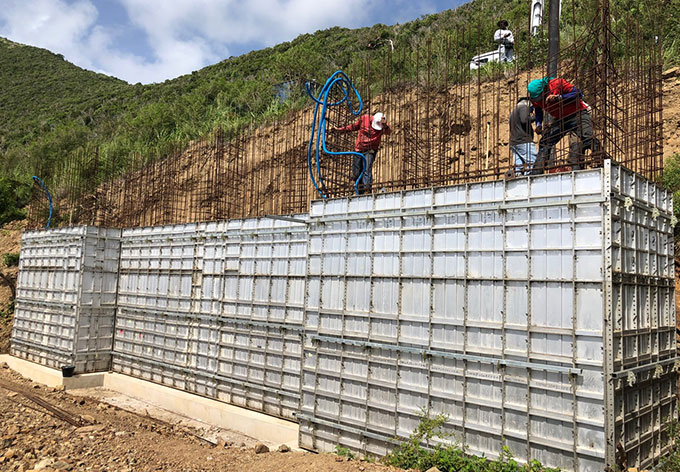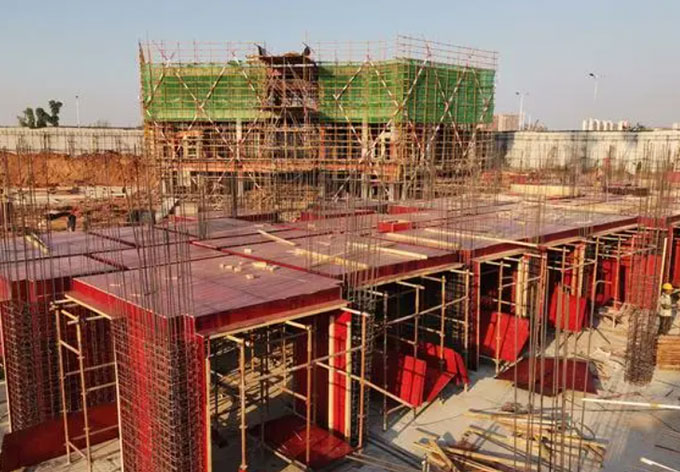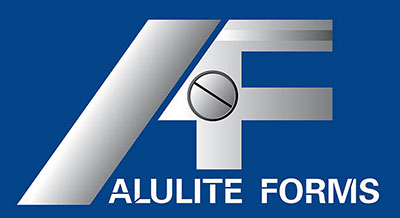1. Material:
Aluminum Panel Formwork: Aluminum panel formwork systems are made of high-strength aluminum alloy 6061-T6, offering lightweight yet durable panels that can be easily handled and transported. These panels provide excellent structural stability and can be reused multiple times without significant wear and tear.
Traditional Plywood Formwork: Plywood formwork is typically made of wood, such as birch or pine or polar, which is less durable and heavier compared to aluminum. While plywood is readily available and cost-effective, it requires more maintenance and may deform or degrade over time, especially when exposed to moisture.


2. Weight and Handling:
Aluminum Panel Formwork: Aluminum panel formwork systems are lightweight, making them easy to handle, transport, and install on-site. This reduces labor costs and increases construction efficiency, especially for large-scale projects where repetitive tasks are involved.
Traditional Plywood Formwork: Plywood formwork is heavier and bulkier compared to aluminum, requiring more effort and manpower for handling and installation. This can slow down the construction process and increase labor costs, particularly in challenging or remote locations.
3. Reusability:
Aluminum Panel Formwork: Aluminum panel formwork systems are designed for multiple reuses, offering long-term cost savings and sustainability benefits. The high-quality aluminum panels maintain their structural integrity and surface finish even after repeated use, reducing material waste and environmental impact.
Traditional Plywood Formwork: While plywood formwork can be reused to some extent, its durability and lifespan are limited compared to aluminum. Plywood panels may degrade over time due to exposure to moisture, concrete seepage, and wear and tear, resulting in higher replacement costs and material waste.
4. Surface Finish and Precision:
Aluminum Panel Formwork: Aluminum panel formwork systems provide precise and uniform concrete surfaces, thanks to the smooth and flat aluminum panels. This results in high-quality finishes with minimal need for additional surface treatments, reducing labor and material costs.
Traditional Plywood Formwork: Plywood formwork may produce rougher concrete surfaces and require more surface treatments, such as sanding or plastering, to achieve the desired finish. This can add to construction time and costs, especially for projects with strict quality standards or architectural requirements.
5. Adaptability and Customization:
Aluminum Panel Formwork: Aluminum panel formwork systems offer greater adaptability and customization options, allowing for the construction of complex shapes, curves, and architectural designs with ease. The modular nature of aluminum panels facilitates quick assembly and adjustments on-site, accommodating last-minute design changes or alterations.
Traditional Plywood Formwork: While plywood formwork is versatile to some extent, it may have limitations in accommodating intricate designs or unconventional shapes. Plywood panels may require cutting, shaping, or additional support structures to achieve specific formwork configurations, leading to increased labor and material costs.
In summary, aluminum panel formwork system offer numerous advantages over traditional plywood formwork, including lightweight construction, durability, reusability, precision, and adaptability. While plywood formwork may be more cost-effective initially, the long-term benefits and superior performance of aluminum panel formwork often make it the preferred choice for modern construction projects.
